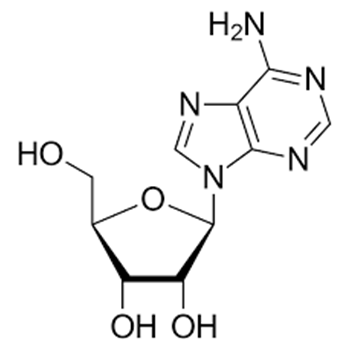Adenosine is a naturally occurring nucleoside composed of adenine and ribose. It plays a crucial role in various physiological processes in the body, including energy transfer, signal transduction, and neurotransmission. Adenosine is found in all living cells and is integral to the production of adenosine triphosphate (ATP), the primary energy carrier in cells.
Key Functions of Adenosine:
1. Energy Metabolism
Adenosine is a fundamental component of ATP, which provides energy for many cellular processes. When ATP is broken down, it releases energy that fuels metabolic activities, muscle contractions, and other essential cellular functions.
2. Regulation of Blood Flow
Adenosine acts as a vasodilator, helping to widen blood vessels and improve blood flow. This property is particularly important during times of increased energy demand, such as exercise, as it ensures that tissues receive adequate oxygen and nutrients.
3. Neurotransmission
In the central nervous system, adenosine functions as a neurotransmitter, modulating neuronal activity. It promotes sleep and relaxation by inhibiting the release of excitatory neurotransmitters. This can help regulate sleep cycles and reduce anxiety.
4. Anti-inflammatory Effects
Adenosine has been shown to possess anti-inflammatory properties. It helps regulate the immune response and can inhibit the activation of inflammatory cells, making it beneficial in managing conditions characterized by chronic inflammation.
5. Cardioprotection
Adenosine plays a vital role in protecting the heart, especially during ischemic events (reduced blood flow). It helps reduce heart rate, myocardial oxygen demand, and protects cardiac tissue from damage during stress.
6. Cellular Signaling
Adenosine is involved in various signaling pathways, influencing cell proliferation, differentiation, and apoptosis (programmed cell death). It helps cells respond to changes in their environment and maintain homeostasis.
7. Potential Therapeutic Uses
Due to its various roles in the body, adenosine has potential therapeutic applications. It is being studied for its effects on heart conditions, neurological disorders, inflammation, and cancer therapy. Additionally, adenosine-based drugs are used in clinical settings to treat certain types of arrhythmias.
Disclaimer: The product information here is for general information use only. These statements have not been evaluated by the Food and Drug Administration or any other regulatory body or organization. These products are not intended to diagnose, treat, cure or prevent any disease.
